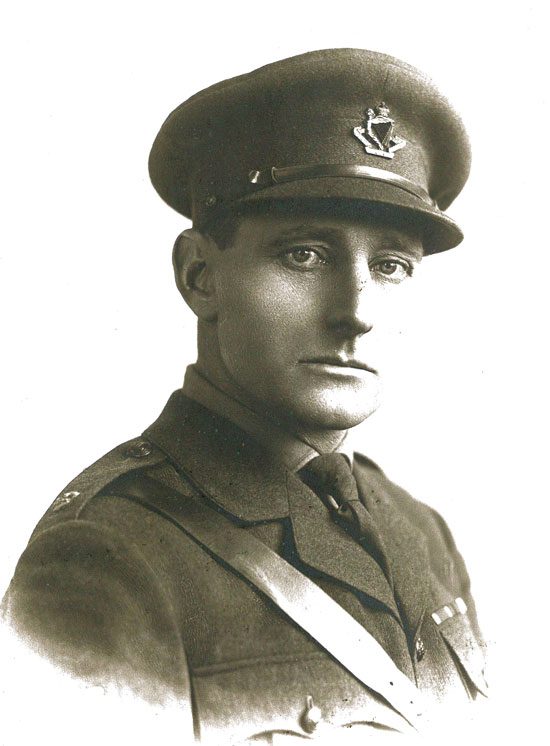![]() In memoriam
In memoriam ![]()
Lieutenant Colonel Richard Annesley West, VC, DSO & Bar, MC, MID
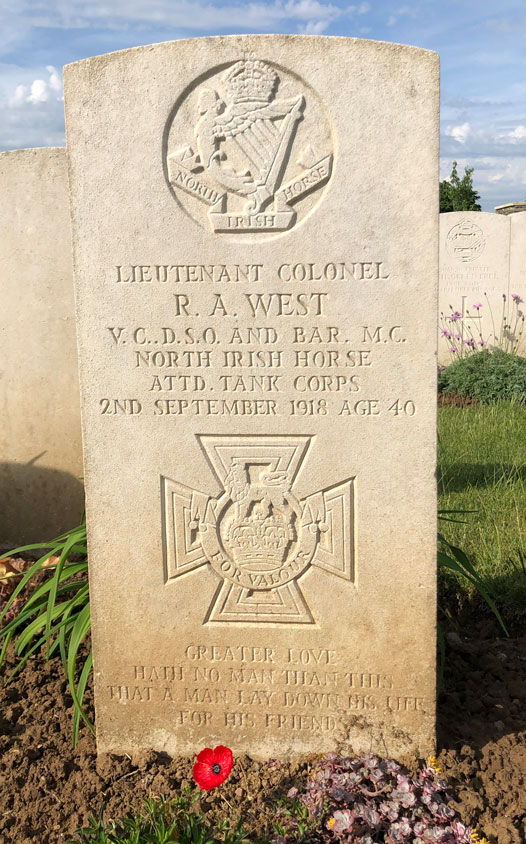
Richard Annesley West was born on 26 September 1878 at Oxford Street, Cheltenham, the sixth child of Irish landowner and former army officer Augustus George West and his wife Sara West (nee Eyre), of Whitepark, County Fermanagh.
On 8 January 1900 he enlisted at Newbridge in the 45th Company, Imperial Yeomanry (also known as the Irish Hunt Squadron) (No.9697), serving in the Boer War from 13 March 1900 to 4 March 1901. He saw action at Lindley, Dewetsdorp and Riddesberg.
Following his discharged at Shorncliffe on 3 April 1901, he returned to South Africa, where on 16 July 1909 he married Maud Ethel Cushing.
On the outbreak of war West sought a commission in the North Irish Horse, intending to sail for France with C Squadron. However, according to an account by Squadron Sergeant Major Trimble:
... as the time for the departure of the squadron came near, [Mr West] wired the War Office asking that his commission be confirmed. There was not any reply to that nor to a further telegram, so he sent yet one more wire, this time ‘reply paid’. The answer came, that he must wait his turn. Mr West would not wait. Late one night, a day or two before the Squadron left Belfast, he came into the makeshift orderly room in Great George’s Street and awakened the author of this article, who was sleeping on a stretcher on the floor. ‘Fill in an attestation form for me,’ he directed and added forcibly that he was not going to wait for the War Office gazetting but would go to France as a trooper. The Form was filled in and Mr West took it away and shortly afterwards brought it back, duly signed by Lord Massereene.
Private West (No.1015) sailed for France with C Squadron on 20 August 1914. Despite his rank he was given command of a troop, allowed to wear an officer’s uniform (though without any badges of rank), and lived in the Officers’ Mess. His commission as a lieutenant came through in September, backdated to 11 August.
Much later, when the War Office inquired as to the date West was discharged in order to take up his commission, the North Irish Horse replied:
... having enlisted on the 20.8.1914 but have since appeared in the Gazette as being Commissioned on the 11.8.1914, it is found difficult to give date of discharge.
West saw action with C Squadron during the Retreat from Mons and Advance to the Aisne from August to September 1914. He wrote a number of letters home describing his experiences, some of which were published in Irish newspapers.
Very fit and well – better than I have been for years; the life suits me. Generally up at 3 a.m.; trek and fight sometimes all day, and often don’t get into camp till 8 or 9 at night … This is a beautiful country. We were sleeping out, but the rain came about a week ago, and now we doss in châteaux or farms. Very few of the men go sick; very healthy country. Big fight going on at present. There is much less hardship than in South Africa – in fact, so far, none.
(Irish Times 1 October 1914)From my own experience, I had far rougher times in South Africa than in this show. They feed the troops splendidly; but, of course, the chances of being knocked out are greater here than in Africa on account of their artillery, which is very good – very smart at coming into action and picking up ranges. We are living in great comfort in a château which overlooks part of the ground on which the present great battle of the Aisne is being fought. There is at present no work for cavalry to do, it being principally long range artillery fire and some infantry attacks, so our horses are getting rested and the sore backs healing up. I have turned the stables of the château into sick-lines, and have all the sick horses there. There is any amount for them to eat, as this is, probably, the greatest agricultural country in the world.
(Irish Times 10 October 1914)
During September West was involved in a number of clashes with enemy cavalrymen. On one occasion he was out scouting with Major Allason of the Bedfordshire Regiment:
They had just been falling back at a walk with the information they had gathered, when they heard a clatter of hoofs behind them, and beheld a German cavalry officer and his man trying to gallop past them – not to attack them – apparently bolting from some of our own cavalry. Allason, who was in front, stuck spurs into his horse and galloped after the officer and shot his horse, bringing the German down, the latter also being put out of action. Then they bound up the German’s wound and took all his papers from him, which proved to be very useful, giving the location of the German cavalry and other troops. Meanwhile the officer’s servant stood by, with his mouth open, doing nothing. As they couldn’t carry the officer off, they left them both there and came on.
On another occasion West was leading a patrol when:
... on rounding a corner in a village, was confronted by a similar patrol of Uhlans, trotting confidently towards the same corner. Mr West did not hesitate. With a shout, he charged straight at the Germans, his troop clattering round the corner after him. Taken by surprise, the Germans, not knowing how many more were coming, wheeled and galloped for safety, the Irish Horsemen after them. The Uhlan’s officer turned into a field and Mr West followed and chased him round the field, the two exchanging shots and the German was killed. One or two prisoners were taken with several of the Uhlan steel lances … In such a scrap with the Germans, Mr West lost his regulation pattern cap, which he replaced with a rather battered slouch hat, turned up on the left; on a puggaree there was fastened an other ranks’ cap badge with the crown broken off.
West's actions were recognised with a mention in Field Marshal French's despatch of 10 October 1914.
During the first months of 1915, West's squadron served as corps headquarters cavalry, based at Bailleul. West wrote that he was "never so bored in my life," and that it was "a bloody existence".
On 13 June 1915 he was attached to the 1/1 North Somerset Yeomanry. He remained with that regiment until near the end of 1917. On 13 September 1915 he was given the rank of temporary captain whilst attached to the Yeomanry, and that rank was confirmed on 18 November. On 9 March 1916 he was given the temporary rank of major whilst attached.
West, as commanding officer of B Squadron of the North Somerset Yeomanry, saw action during the Battle of Arras on 11 April 1917. He was later awarded a Distinguished Service Order for the part he played, the citation reading:
His squadron was sent forward to reinforce the right flank of the Brigade under very heavy shell and machine-gun fire. By his excellent example, rapid grasp of the situation and skilful disposition of his squadron, he did much to avert an impending counter-attack. He had shown great ability in command since July 1915.
West's own report of the action appeared in the regimental war diary:
About 3 p.m. on the 11th April I received orders ... to proceed with my squadron dismounted to support Lt-Col. Burt D.S.O. 3rd Dragoon Guards who was holding the line from the S of Monchy to La Bergere. I immediately sent Lt. Pope M.C. with orders to proceed as far as possible mounted and then go forward on foot and report to Lt-Col Burt that I was bringing up B Squadron up to his support, also to get the situation as far as possible so that I should have it on arrival. Ten minutes later I advanced with B Squadron on foot, the Hotchkiss Guns and tool packs on pack horses. On reaching 6th Cav. Bde H.Q. ... I off loaded the packs and sent the horses back and proceeded in half troops at about 200 yards interval to the 3rd D.G’s H.Q. about 300 yards N. of Les Fosses Farm. Having got the situation from Lt-Col. Burt, I sent Nos. 1 & 2 troops under Lt. Pope to La Bergere Farm, also 1 M.G. under 2 Lt Emms M.G.C. Leaving Nos. 3 & 4 troops and one M.G. under Lt. Richardson near the 3rd D.G’s H.Q. in reserve at Lt-Col. Burt’s request. I then went up to La Bergere. The British front line then crossed the Arras-Cambrai road about 50 yards E. of the X roads at La Bergere running N. & S., on the S. side running through pt. 75. and thence onwards towards Wancort. North of the Arras-Cambrai road the line was held by the 3rd D.G’s and Infantry. South of the Arras-Cambrai road the line was held by only a few details of the 6th Bedford Regt, North Lancs. Regt, East Lancs. Regt and Warwick Regt. in all about 25. No officers or N.C.O. were present. They were very short of ammunition, several men whom I questioned having only 5 or 10 rounds. Their right flank was entirely in the air. A Private of the 6th Bedford Regt. ... had done most excellent service, making other men use captured German rifles and ammunition, in order to save their own and had instructed them in throwing German bombs. The trench line was a captured German one, very shallow, no dugouts, no wire and out men were naturally holding it the reverse way. I decided to go back to the 3rd D.G’s H.Q. to report situation to Lt-Col. Burt and get more ammunition, leaving Lt. Pope in charge. Before I left Lt. Tisdale M.G.C. arrived with 2 M.G’s, having been delayed by casualties on the way up. On my arrival at the 3rd D.G’s H.Q. I found LT-Col. Burt had sent Lt Richardson and the two troops I had left in reserve forward to assist in the consolidation of the line held by the 3rd D.G's. The line South of the Arras-Cambrai Road to point 75 being new re-inforced by 3 M.G’s and 2 Hotchkiss Rifles and 2 troops N.S.Y. I placed a post of 1 Hotchkiss Rifle and 6 men ... with orders to shoot only on the right of the line of telegraph poles running down the La Bergere-Wancourt road to protect the rear of our line. As soon as the ammunition arrived under 2 Lt. Hannan, I guided the party up to La Bergere and issued ammunition to the troops. It was now getting dusk and the German working Parties came out from Guemappe and commenced work on the northern side of the village. These parties were dispersed by our M.G. and rifle fire, parties of the enemy were continually seen moving on the outskirts of Wancourt and Guemappe but were dealt with by our M.G's, while the work of consolidation progressed. We held our position from 3.30 p.m. to 1.30 a.m. on the night of the 11th/12th when we were relieved by 2 companies of the Middlesex Regt.
During the whole of this period the enemy was very active and on several occasions was seen to be massing for counter-attacks, but his attacks were never allowed to develop, being instantly dealt with by our M.G. and rifle fire.
All ranks showed great determination and cheerfulness under very trying circumstances as this was their third consecutive night in the open in the most severe weather.
He was also recognised with a mention in Field Marshal Haig's despatch on 7 November 1917.
West went on leave to England on 31 August 1917, at the same time relinquishing his acting rank.
In December 1917 he transferred to the Tank Corps, joining the 6th Battalion in the field on 2 January 1918. Soon after he was given command of C Company with the rank of acting major.
At the beginning of the Advance to Victory offensive, on 9 August 1918, West was wounded while commanding his company of Whippet tanks in the fighting east of Villers-Bretonneux. He was later awarded a Military Cross for his actions that day:
For conspicuous gallantry and good leadership. He commanded a company of light Tanks with great skill. He had two horses shot under him during the day, and he and his orderly killed five of the enemy and took seven prisoners. He rendered great services to the cavalry by his personal reconnaissances, and later in the day, under heavy machine-gun fire, he rallied the crews of disabled Tanks and withdrew them with great skill. He set a splendid example of courage and devotion to duty throughout the operations.
On 12 August he was made second-in-command of the 6th Battalion.
Nine days later the battalion had moved north to the Third Army’s VI Corps front, their objective being to support the infantry advance to the railway in the vicinity of Courcelles. Lieutenant-Colonel Wood was killed early on and West assumed command of the battalion, moving forward with the attack to help maintain cohesion, at first mounted and then on foot after his horse was shot. The attack was a success and West was later awarded a Bar to his DSO:
For conspicuous gallantry during an attack. In addition to directing his Tanks, he rallied and led forward small bodies of infantry lost in the mist, showing throughout a splendid example of leadership and a total disregard of personal safety, and materially contributed to the success of the operations. He commanded the battalion most of the time, his C.O. being early killed.
On 2 September VI Corps attacked Vaulx Vraucourt over ground difficult for tanks and infantrymen alike. The Whippets were initially held back for use later in the day, so West, now commanding officer of the 6th Battalion, rode forward to follow the progress of the infantry. While he was there an enemy counter-attack developed and West was killed. For his most conspicuous bravery, leadership and self-sacrifice that day and on 21 August he was awarded a Victoria Cross:
. ... it was intended that a battalion of light Tanks -under the command of this officer should exploit the initial infantry and heavy Tank attack. He therefore went forward in order to keep in touch with the progress of the battle, and arrived at the front line when the enemy were in process of delivering a local counterattack. The infantry battalion had suffered heavy officer casualties, and its flanks were exposed. Realising that there was a danger of the battalion giving way, he at once rode out in front of them under extremely heavy machine-gun and rifle fire and rallied the men. In spite of the fact that the enemy were close upon him he took charge of the situation and detailed non-commissioned officers to replace officer casualties. He then rode up and down in front of them in face of certain death, encouraging the men and calling to them, “Stick it, men; show them fight; and for God's sake put up a good fight.” He fell riddled by machine-gun bullets. The magnificent bravery of this very gallant officer at the critical moment inspired the infantry to redoubled efforts, and the hostile attack was defeated.
West is the only North Irish Horseman to have been awarded a Victoria Cross, and one of only four Great War Tank Corps VCs.
He was also recognised with a mention in Field Marshal Haig's despatch on 8 November 1918 – his third mention.
Lieutenant-Colonel West was buried at Mory Abbey Military Cemetery, Pas-de-Calais, France, grave III.G.4. His gravestone inscription reads as follows:
LIEUTENANT COLONEL
R. A. WEST
V.C. D.S.O. AND BAR. M.C.
NORTH IRISH HORSE
ATTD. TANK CORPS
2ND SEPTEMBER 1918 AGE 40
GREATER LOVE
HATH NO MAN THAN THIS
THAT A MAN LAY DOWN HIS LIFE
FOR HIS FRIENDS
His name is included on the Brookeborough War Memorial, County Fermanagh, and the Carrickfergus War Memorial, County Antrim (see images below).
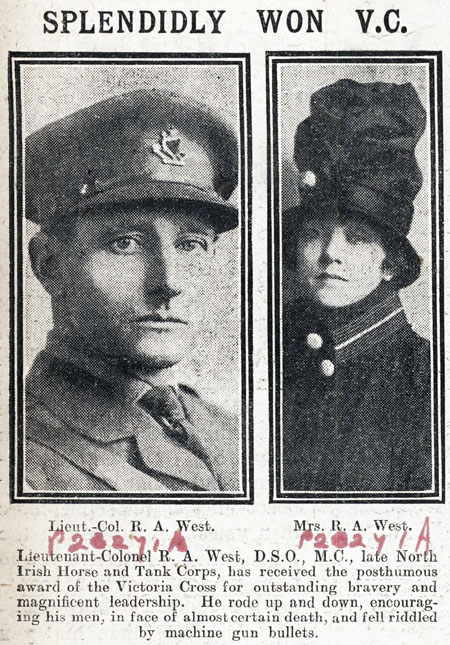
Daily Mirror, 31 October 1918
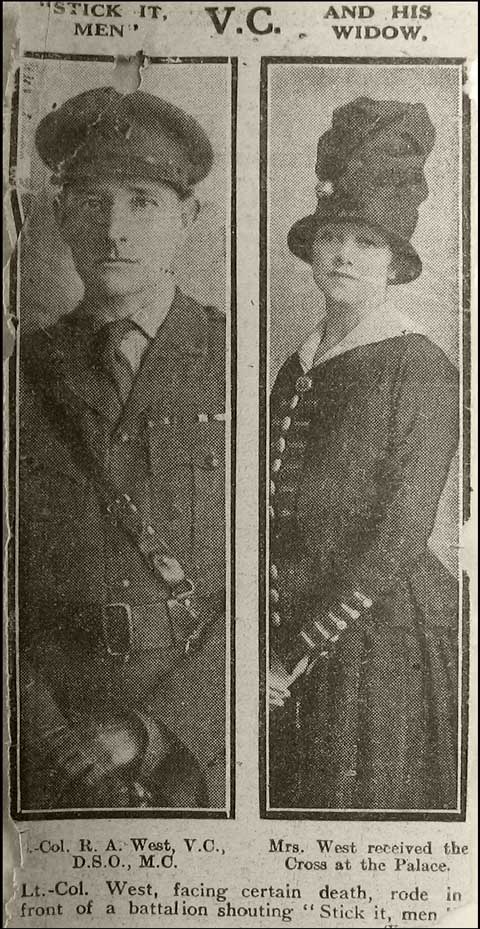
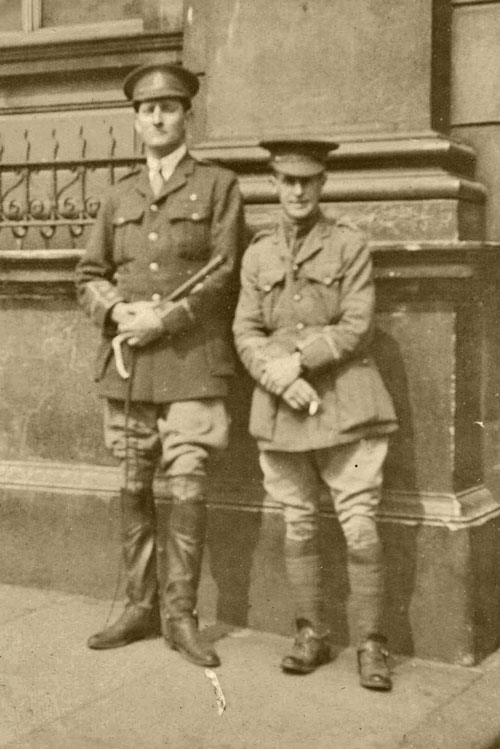
West with North Irish Horse officer Barrie Combe, in August or September 1914
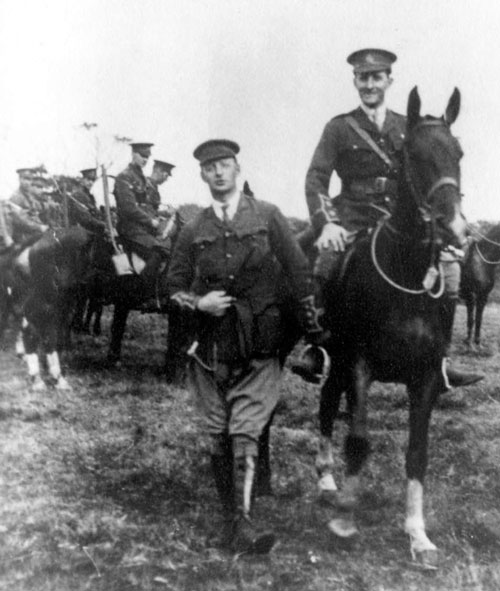
West (mounted) with North Irish Horse officer Captain Holt Waring
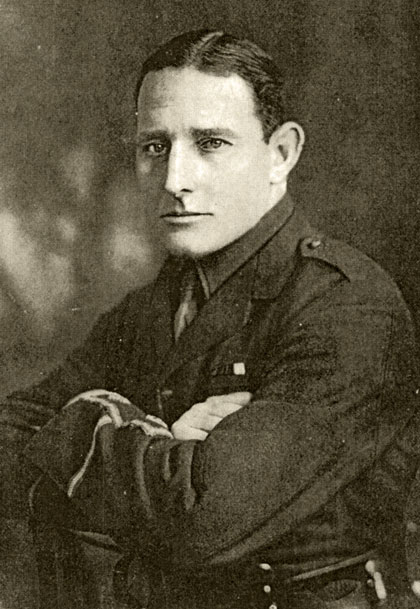
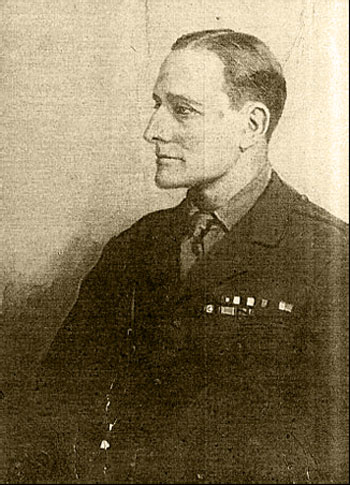

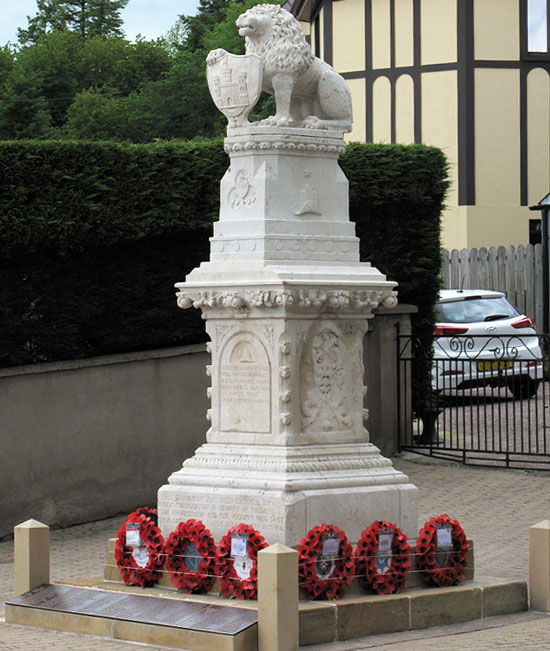
Brookeborough War Memorial
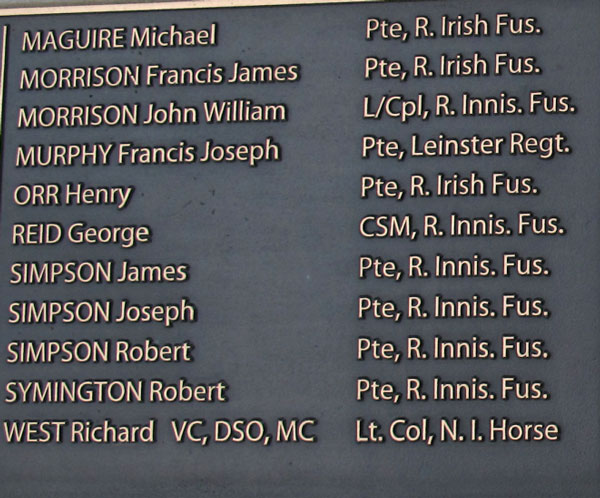
Brookeborough War Memorial
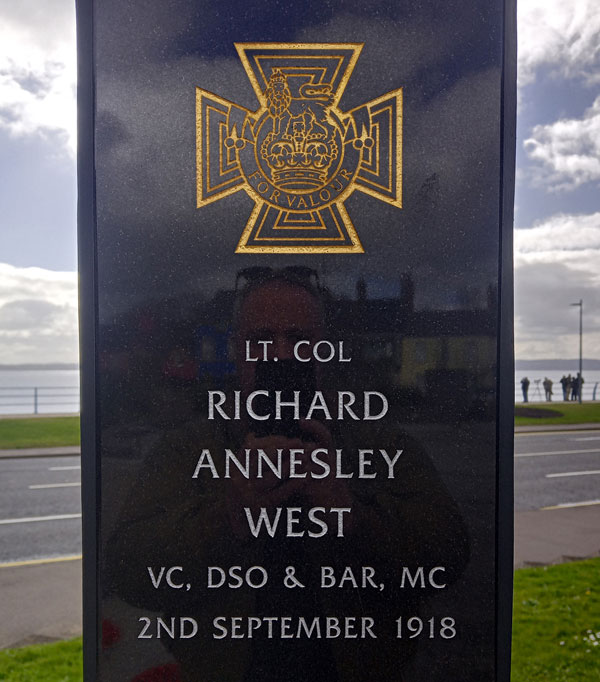
Carrickfergus War Memorial
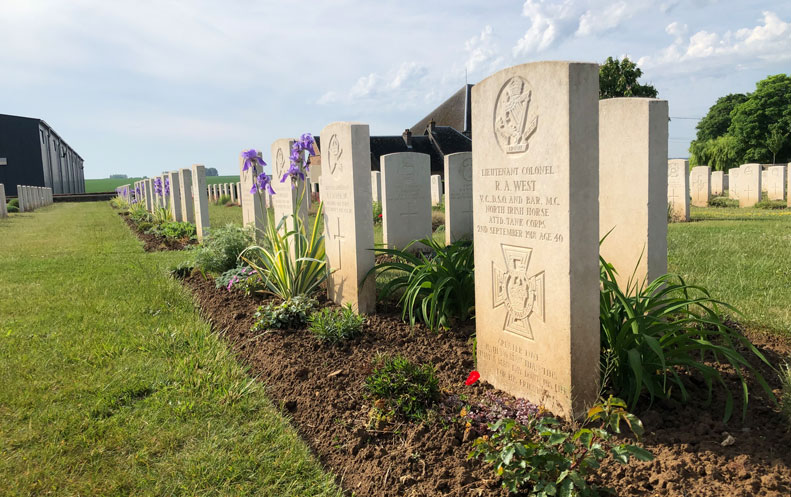

A portrait of West's widow Maude.
The first image is provided courtesy of the Monkton Combe School; the fifth image is from my private collection; the sixth by the Public Records Office of Northern Ireland (PRONI Ref. d.1482.12); the seventh, eighth and ninth provided by Gerry Chester; the Brookeborough War Memorial images were sourced from the Irish War Memorials site; and the Carrickfergus image provided by John Gray. The cemetery images are Copyright © Phillip Tardif with all rights reserved as set out in this Use of Material policy.
This page last updated 19 April 2024.

